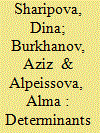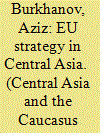| Srl | Item |
| 1 |
ID:
153600


|
|
|
|
|
| Summary/Abstract |
This article investigates the determinants of ethnic and civic nationalism in post-Soviet Kazakhstan. Using data from an original nation-wide survey (N = 1600), the regression analysis is applied to evaluate the influence of trust and perceptions of discrimination as well as sociodemographic factors on people's support of civic and ethnic nationalism(s) in Kazakhstan. The results show that trust in political institutions, perceived discrimination, and the knowledge of the Kazakh language have an impact on both types of nationalism. In addition, intragroup (ethnic) trust and income determine civic–nationalist attachments, while rural residence, Kazakh ethnicity, income, and other ethnic minorities influence ethnonationalism in Kazakhstan.
|
|
|
|
|
|
|
|
|
|
|
|
|
|
|
|
| 2 |
ID:
078075


|
|
|
|
|
| Publication |
2007.
|
| Summary/Abstract |
The European Union, one of the world's most successful integration projects, is inevitably analyzed by every expert who probes deep into the international trends of our time.
The union of 27 countries, with a population of about 480 million who produce about 28% of the world's GDP, has certain interests in Central Asia even though the EU's geopolitical status has not yet been fully developed. The EU wants to see stable and democratic regimes with market economies in Central Asia that are guided by Western values and standards. This will reduce the region's conflict potential and its criminological impact on the EU in the form of drug trafficking and illegal migration and improve the conditions in which European companies are functioning in the local economies and the energy sector.
To achieve this, the European structures use various instruments ranging from the TACIS and TEMPUS programs of technical assistance designed to promote structural and institutional reforms in the economic and legislation spheres, as well as in state administration and education, to the TRACECA and INOGATE programs of transportation infrastructure modernization and political support of the human rights organizations.
Energy is the central issue of the EU's economic interests in the Central Asian countries for the simple reason that
|
|
|
|
|
|
|
|
|
|
|
|
|
|
|
|